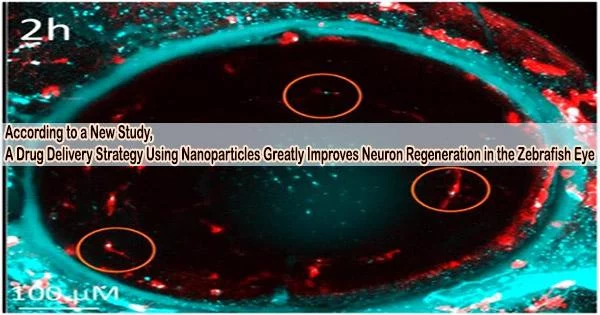According to a recent study from the Wilmer Eye Institute, utilizing a nanoparticle to target immune cells in zebrafish eyes improved the rate of neuron regeneration following injury.
This study builds on earlier research from Wilmer and other institutions that demonstrated how immune cells (microglia) control the regeneration of retinal cells in zebrafish and mice models.
In this latest paper, published in Communications Biology, researchers report that using a nanoparticle to target and deliver an immunosuppressant drug to active microglia in degenerating zebrafish retinas is an effective method of dosing and stimulating regeneration of lost retinal cells.
“Here we found bringing an immunosuppressive medicine directly to microglia cells enhances these effects, speeding up the regenerative process even more dramatically about twice as fast as the drug alone,” says Jeffrey Mumm, Ph.D., corresponding author and the Helen Larson and Charles Glenn Grover Professor in Ophthalmology and associate professor of ophthalmology.
Dexamethasone, an immunosuppressant medication, was initially connected to the nanoparticle dendrimer, which had earlier been created at Wilmer with the assistance of Kannan Rangaramanujam, Ph.D., M.S. In the experiment, active immune cells in the retinas of zebrafish were given the drug payload by the nanoparticle, which then reduced the cells’ activity.
Humans can regenerate certain tissues and cells just fine our skin, our gut lining, the neurons in our nose we use for smell. The field of regenerative biology is now looking at ways to manipulate human regenerative capacities in a way that’s beneficial for other parts of the body.
Jeffrey Mumm
An adaptive optics-corrected lattice light sheet microscope, a specialized imaging technique that allowed the team to collect almost real-time images of the zebrafish eye, allowed researchers to confirm that this suppression improved neuron regeneration rates.
“Dendrimers provide an exquisite targeting tool by bringing medications directly to the immune system and allowing us to modify immune cell activity while limiting negative side effects from powerful immunosuppressants,” says Mumm. “This technique is like using a scalpel to test the effects of immune suppression rather than a sledgehammer.”
Mumm expects that this discovery, with its focus on restoring vision rather than avoiding vision loss, will be transformative for patients with vision loss and other eye disorders, even if this therapy procedure still needs to be tested in mammals and eventually humans.
“Humans can regenerate certain tissues and cells just fine our skin, our gut lining, the neurons in our nose we use for smell,” says Mumm. “The field of regenerative biology is now looking at ways to manipulate human regenerative capacities in a way that’s beneficial for other parts of the body.”
















